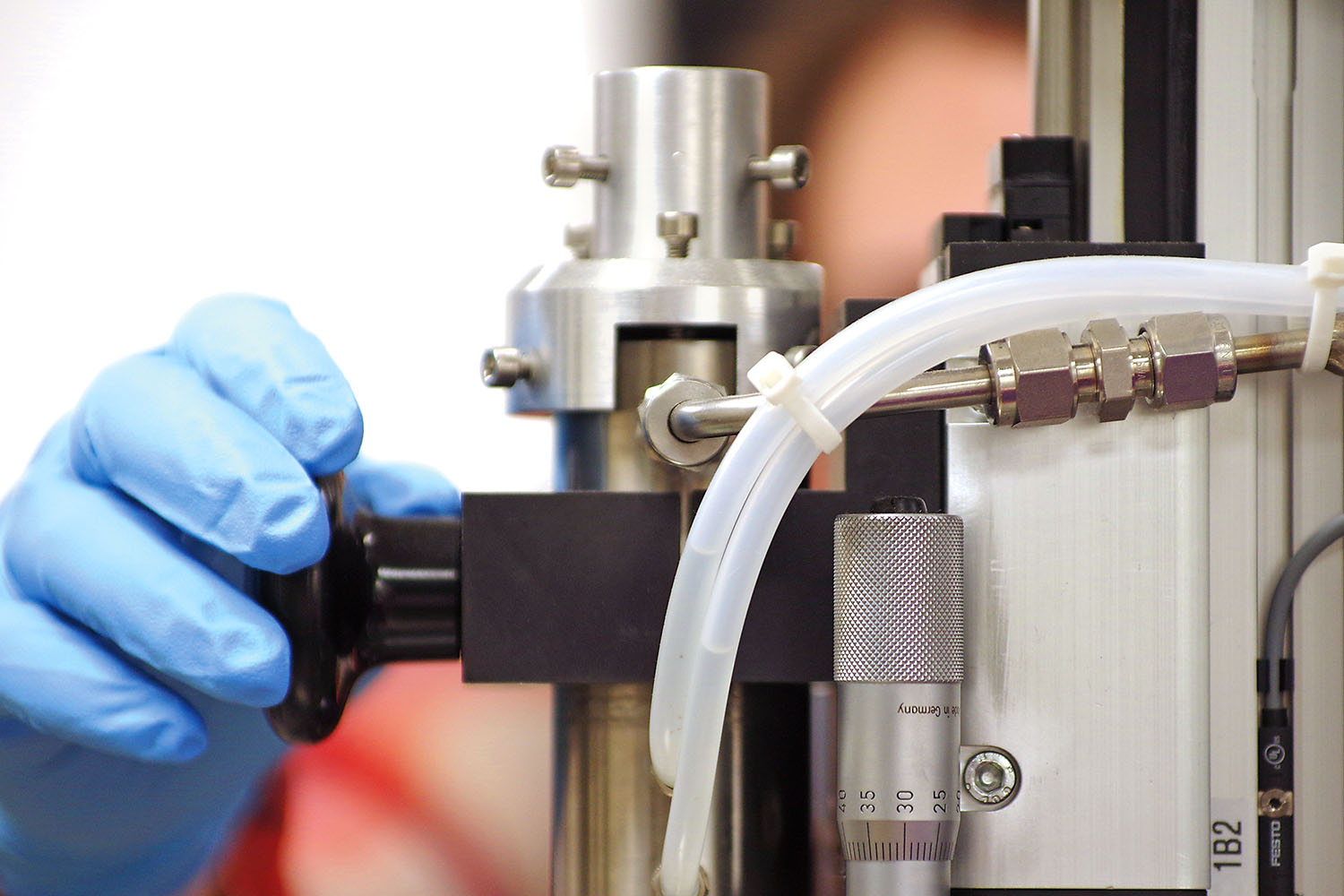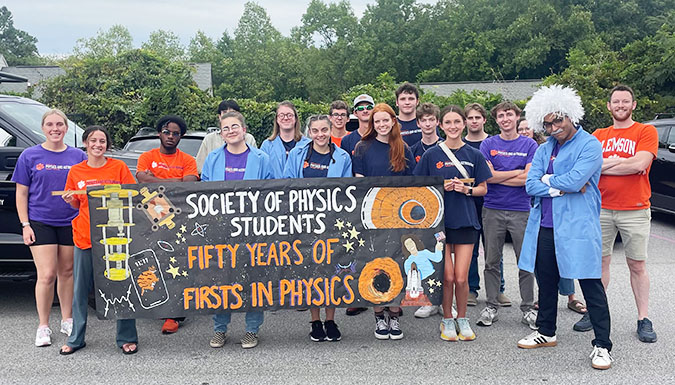Undergraduate Program Overview
 The undergraduate physics curricula provide students with a strong background in the classical areas of physics as well as an introduction to the more important aspects of modern physics. The bachelor of science curriculum is directed toward preparing students for graduate study, ultimately leading to the doctorate degree or toward research and development work in industrial or governmental laboratories. It also provides a good background for graduate study or industrial work in many areas of engineering, physics and applied science, such as materials science and engineering (PDF).
The undergraduate physics curricula provide students with a strong background in the classical areas of physics as well as an introduction to the more important aspects of modern physics. The bachelor of science curriculum is directed toward preparing students for graduate study, ultimately leading to the doctorate degree or toward research and development work in industrial or governmental laboratories. It also provides a good background for graduate study or industrial work in many areas of engineering, physics and applied science, such as materials science and engineering (PDF).
The bachelor of arts in physics program is ideal for students interested in acquiring a broad-based liberal arts education that includes a strong and solid understanding of either science or a broad exposure to engineering with a strong physics foundation.
The bachelor of science with biophysics concentration offers excellent preparation for medical school or graduate work in biological sciences. It includes the flexibility of selecting courses in chemistry, biological sciences, physics and mathematics. This concentration also provides the necessary background for employment in industry, manufacturing and instrumentation for clinical or molecular biology applications.
One Department, Many Options
Bachelor of Arts
The bachelor of arts curriculum is ideal for students interested in acquiring a broad-based liberal education that includes a strong and solid understanding of either science or a broad exposure to engineering with a strong physics foundation.
Students also have the option to pursue a double major in physics and science teaching — physics, which prepares students for teaching physics on the secondary school level and for graduate studies in physics. Students declare the double major using the appropriate program form. More information about the curriculum is available in the online catalog.
- Prospective students: View the current undergraduate catalog. Archived catalogs may also be available for reference.
- Current students: Refer to the catalog corresponding to your year of matriculation for detailed information. Browse the Clemson University Catalog System.
Bachelor of Science
The bachelor of science curriculum is directed toward preparing students for graduate study, ultimately leading to a doctorate degree or toward research and development work in industrial or governmental laboratories. It also provides a good background for graduate study or industrial work in many areas or engineering physics and applied science.
- Prospective students: View the current undergraduate catalog. Archived catalogs may also be available for reference.
- Current students: Refer to the catalog corresponding to your year of matriculation for detailed information. Browse the Clemson University Catalog System.
Interdisciplinary Emphasis Area (B.S.)
The study of physics provides an excellent foundation for the pursuit for a wide variety of intellectual pursuits. The interdisciplinary option is a customizable degree that allows you to work with an advisory to build on the physics curriculum to design your own degree. Our students have combined the study of physics with many fields including art, philosophy, neuroscience, engineering, economics, forensic science, astronomy and pre-med. Whether your goal is to pursue a career as a data scientist, a doctor or a lawyer, physics provides the problem-solving tools and critical thinking skills to be a leader in your chosen profession.
- Prospective students: View the current undergraduate catalog. Archived catalogs may also be available for reference.
- Current students: Refer to the catalog corresponding to your year of matriculation for detailed information. Browse the Clemson University Catalog System.

Student Resources
New and Transfer Student Resources
-
Utilizing AP Credit Toward Your Degree
Clemson University accepts AP test scores of 3 or above for most, but not all, courses. AP credit will translate into transfer credit, and one to four hours will be awarded for a course, meeting any degree requirements for that course. Grade points will not be contributed to the student’s GPA.
Example: If a student makes a score of 3 on the AP chemistry exam, the student will automatically receive credit on their transcript for CH 1010 upon Clemson receiving the AP credit. It will count as a natural science requirement for their required general education course, and it will contribute four hours to the student’s overall number of hours completed at the University.
When registering for the AP exam, indicate if you wish to have the final results sent to Clemson University (CEEB No. 5111). Be sure to include your Social Security number when registering for AP exams. This will save time and ensure that credit is automatically awarded to your Clemson academic record.- View the AP test scores accepted by Clemson University (PDF)
- Credit Transfer Charts | Clemson University, South Carolina
Should I Utilize AP Credit?
One of the most common questions we receive from prospective students is whether or not to utilize AP credit. AP credit for non-major courses can free up students’ schedules for different electives. Specifically with respect to the Physics AP, although students can use AP credits to skip Physics 1220, generally we recommend taking the course at Clemson. Some students who have AP credit choose to retake PHYS 1220, others will skip depending on their HS preparation. Either choice is allowed. We encourage students to discuss this with their academic advisor.
Determining Class Placement
If a student is anticipating AP physics credit, refer to the below score ranges and class placements.
- AP Physics C (Mechanics) score 1, 2: no Clemson credit; placement in PHYS 1220.
- AP Physics C (Mechanics) score 3, 4, 5: Clemson credit for PHYS 1220 and PHYS 1240; students can elect to start in PHYS 2210.
- Physics C (Mechanics) score 3, 4, 5 and AP Physics C (E&M) score 1, 2: Clemson credit for PHYS 1220 and PHYS 1240; placement in PHYS 2210.
- AP PHYSICS C (E&M) score 3, 4,5 : Clemson credit for PHYS 1220+1240 and PHYS 2210 and PHYS 2230; students can elect to start in PHYS 2220.
-
New Student/Transfer Orientation Information
New and transfer student orientation is held regularly.
- Visit the Clemson orientation page: CSLE | Division of Student Affairs, Clemson University, South Carolina
PHYS 1220
- Prerequisite or Corequisite MATH 1060, or permission of the department.
- Section 003/004 is reserved for physics majors or members of the Clemson Honors College.
PHYS 2210
- Prerequisite or corequisite MATH 1080 and PHYS 1220.
- Section 005/006 is reserved for physics majors or members of the Clemson Honors college
MATH 1060 Prereq
- SAT math > 680
- ACT math >29
- Clemson Math Placement Test > 80
CH 1010
There are no prerequisites or corequisites for CH 1010, but we highly encourage students who register to have already have earned a C or better in MATH 1010 or MATH 1020 or MATH 1030, or concurrent enrollment in MATH 1040, 1060, 1080, 2060, 2080 or STAT 2300.
CH 1010 Section Restrictions
- Sections 001 to 014: No restrictions, but in-person attendance enforced, no online accommodations
- Section 041: Online synchronous only
- Section 072: Honors students only
-
Academic Advising
Academic advising is an integral part of the College of Science commitment to help students meet their academic and personal goals. The department will assign you a faculty member who will serve as your academic advisor throughout your years here at Clemson. When a student first gets accepted to the physics program, they will work with the undergraduate student coordinator to come up with a plan for their first year.
Beyond the Classroom
The College of Science is home to a multitude of programs to assist first-year and continuing students in their coursework and life outside the classroom here at Clemson.
-
COSMIC
COSMIC is the College of Science Mentoring and Inclusion Collaborative. It is an award-winning peer mentoring program intended to support incoming students with their transition to Clemson by matching them with upperclassmen mentors who come from similar backgrounds and share similar interests.
Affinity groups in the COSMIC Ecosystem include women, men, military and veteran students; first-generation students; transfer students; students with disabilities; students of color; and LGBTQIA+ students. COSMIC also offers faculty and staff liaisons who provide academic support to mentors and mentees. This is truly an inclusive program at Clemson University, providing cross-cultural collaboration and engagement.
To find those upperclassmen, incoming students will complete a COSMIC mentee application that shares their experiences and interests. The applications will then be matched with mentors based on the above-mentioned criteria. Mentors will help their mentees navigate college life by checking in, setting goals, answering questions and providing support. Any student admitted to the university as a College of Science major is eligible to apply. Acceptance into the program, however, is on a first-come, first-served basis.
-
Women in Physics
Women in Physics is an organization that provides community for women in the department of physics and astronomy. In monthly lunch meetings, the club discusses current STEM, gender and education topics of interest. The organization regularly hosts coffee breaks with visiting scientists for enhanced networking opportunities. During Women’s History Month, all members of the department are invited to enjoy snacks while discussing favorite female physicists.
READY TO TAKE THE NEXT STEP?
Apply to the Department of Physics

Society of Physics Students
Physics Students Get Involved
The Clemson Society of Physics Students is an undergraduate student organization for physics students and a chapter of the National Society of Physics Students. The society hosts a variety of events for physics students that encourage socialization and community outreach. In addition, mentoring is offered via a buddy system that pairs freshmen and sophomores with upperclassmen.
Connect With the Society